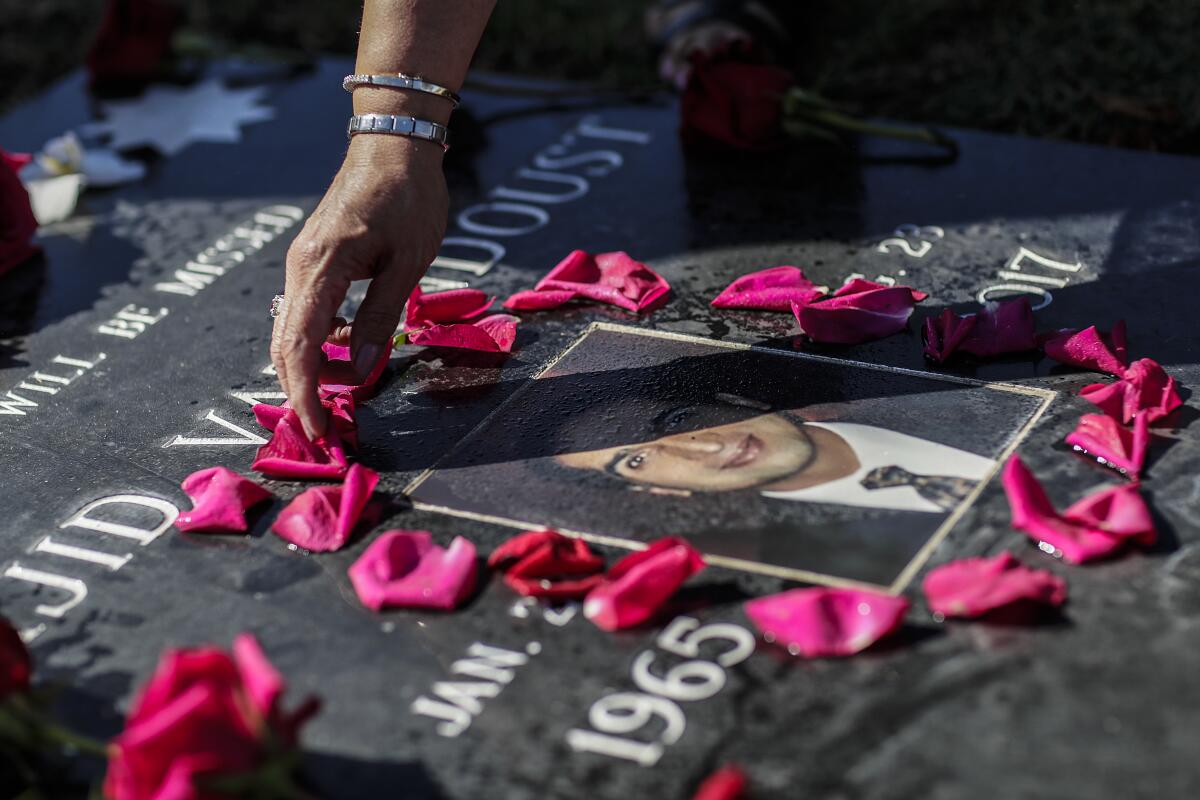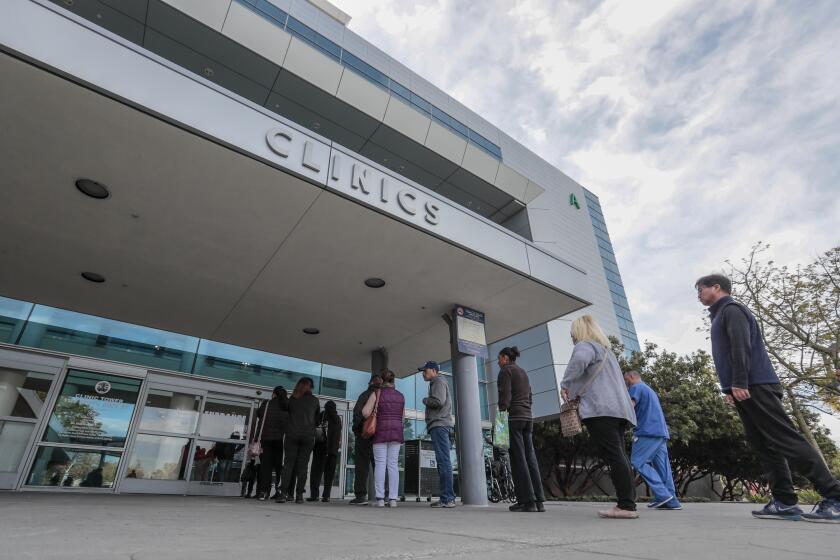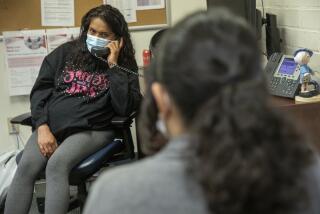California regulators launch review of long, deadly delays in L.A. County specialty care

- Share via
As current and former doctors in Los Angeles County’s public hospital system condemn delays in providing specialist care, California regulators have launched a review of the long, sometimes deadly waits faced by patients who need treatment from one of the nation’s largest public health systems.
The actions come in the wake of a Times investigation that found patients of the Los Angeles County Department of Health Services face agonizing delays to see specialists after referrals from primary care providers, leaving many with intolerable pain, worsening illnesses and a growing sense of hopelessness. The Times report included several patients who died of the conditions they waited to have treated.
The California Department of Health Care Services will review whether any managed care plan that offers Medi-Cal — the government-subsidized program that covers low-income Californians and most county patients — violated its contract with the state to provide adequate access to care, an agency spokeswoman said.
“Any untimely death is a tragedy, and our hearts go out to the families suffering the loss of a loved one. The wait times outlined by The Times are unacceptable,” Michelle Baass, undersecretary of the California Health and Human Services Agency, said in a statement. “Timely access to care is a fundamental patient right.”
The review is the second underway by the state. The California Department of Managed Health Care began an investigation of the county’s wait times this year in response to questions from The Times about delays in specialist appointments.
Baass is overseeing both inquiries after her boss, state Health Secretary Dr. Mark Ghaly, recused himself. Ghaly is married to the director of the Los Angeles County safety-net hospital system, Dr. Christina Ghaly.
The average wait to see a specialist in the L.A. County system was 89 days, according to a Times data analysis of more than 860,000 requests for specialty care at the county’s Department of Health Services, which serves more than 2 million people, primarily the region’s poorest and most vulnerable residents.
Even patients waiting to see doctors whose prompt care can mean the difference between life and death — neurologists, kidney specialists, cardiologists — endured delays that stretched on for months, according to the data, which consisted of nonemergency requests from primary care providers to specialists from 2016 through 2019.
Several doctors who now work for the county or recently left called for reform, including better communication between primary care providers and specialists as well as a dramatic increase in hiring of specialists.
Thousands of patients in L.A. County’s public hospital system face long, sometimes deadly waits to see specialists, a Times investigation has found. The system serves primarily the region’s poorest and most vulnerable residents.
Dr. Michael Hochman, a primary care physician and associate professor of clinical medicine at USC’s Keck School of Medicine, who has practiced at safety-net health systems on both coasts, said Los Angeles County’s is “the least effective system that I’ve worked at in my 14 years since I graduated medical school.”
Hochman said it was “particularly frustrating” to try to get patients potentially lifesaving radiology tests at L.A. County-USC Medical Center, the county’s flagship safety-net hospital in Boyle Heights. When family practitioners make such referrals, “you’re usually worried about cancer, some serious illness like that,” Hochman said. “It’s not the kind of thing that can wait a few months.”
He contrasted those long waits to what happens for privately insured patients treated at USC’s Keck Hospital. “You ask for it and it’s done before you’ve finished signing the order,” Hochman said.
Hochman, who once worked as a health advisor to L.A. County Supervisor Mark Ridley-Thomas, said having a health system overseen by politicians instead of medical professionals makes it particularly resistant to change.
“They are elected officials, and they want to paint a rosy picture of what’s going on rather than necessarily taking on the root cause of the problems, which is hard work,” Hochman said.
Members of the Los Angeles County Board of Supervisors have said little about The Times’ findings.
In an email, board Chairwoman Kathryn Barger wrote that the well-being of patients in the safety-net system is an “important responsibility,” adding, “we must continue to look for improvements and enhancements to ensure the highest quality of care for our vulnerable residents.”
Supervisor Sheila Kuehl, reached by text the day the investigation was published, replied: “Sorry no time at all today. Please pay attention to the info provided by DHS.” Asked whether she was satisfied with the waits, Kuehl replied: “Im in back to back mtgs. Sorry. Won’t be answering again.”
Dr. Christina Ghaly, director of the county’s health services, and her top deputies criticized The Times’ investigation, saying its descriptions of individual patient cases were “inaccurate” and “misleading,” but they declined to elaborate, citing healthcare confidentiality laws.
They accused The Times of “manipulating data” and failing to account for a triage system that prioritizes patients based on their individual health needs. In letters and emails to the newspaper, they said the newspaper’s investigation “cherry-picked” cases from before the county revamped its referral system in recent years and hired more specialists.
The county, Ghaly said, has won praise from the healthcare industry for introducing an internal email system, called eConsult, that allows primary care providers to confer with a specialist about a patient’s condition and whether additional testing or a face-to-face appointment with a specialist is necessary.
From before eConsult’s introduction in 2012 to 2018, the number of face-to-face patient visits scheduled with specialists dropped by about 41%, county officials said, helping cut wait times for other patients who need to see a specialist.
In previous interviews with The Times, some county primary care doctors and nurses complained that eConsult seems designed to prevent or delay appointments with overburdened specialists.
Dr. Jonathan Bergman, a urologist at the county’s Olive View-UCLA Medical Center in Sylmar, praised eConsult for shortening delays and said it could be a model for other health systems. But he said waits remain too long. “That number got reduced from infinity to a number that is still too big,” Bergman said.
The county, he said, still suffers from a chronic shortage of specialists.
“Clinics are way too full, they still are,” Bergman said. “Even if you make things maximally efficient, until you hire enough specialists, you definitely are going to have a problem.”
A doctor who left the county last year said one of her patients with gallbladder problems had to wait “months and months and months, and it wasn’t until she got infected, really dangerously sick, that they did her surgery,” she said. “That was a pattern.”
The doctor, who spoke on condition of anonymity for fear of retaliation, said she still worries that she will be sued for something she missed while working for the county because she had so little time with patients.
“If you can talk to your patients, you can get the diagnosis, which is what you need,” she said. “At DHS, you were always robbed of that.”
It’s unclear how many patients die waiting to see specialists; county health officials said they don’t track that. But The Times reviewed the medical records of six patients who faced delays of at least three months to see specialists and died of the illnesses they waited to have treated.
They included 61-year-old Isabel Lainez, whose bladder and kidney problems were so bad she became incontinent — wetting herself on the bus, in the car, in an elevator — while waiting 10 months to see specialists. She died of chronic kidney disease before she got an appointment.
The Times’ investigation finding long, sometimes deadly waits to see specialists in L.A. County’s Department of Health Services started with a phone call from a doctor in 2018.
Majid Vatandoust was denied a colonoscopy, despite classic symptoms of colon cancer, because he was 49 and his county gastroenterologist said cancer screening is “not valid for patients under 50.” By the time Vatandoust turned 50 and was approved for the test, the cancer in his colon had spread to other organs. It killed him two years later.
A decade ago, a public outcry over lengthy medical delays and patient deaths spurred California to set specific limits on how long HMOs can keep sick people waiting to see a doctor.
The time standards require health insurers — including those offering Medi-Cal, which covers about a third of Californians — to provide appointments with specialists within 15 business days, or four days in urgent cases.
The Times’ analysis of specialist appointments provided by the county’s health services found that 88% occurred more than 15 business days after a primary care provider — a doctor or nurse practitioner — made a referral.
Because the regulation applies to the insurers and not doctors and hospitals directly, L.A. County health officials said they view the time standards as “guidance.”
But the county’s contract with the largest insurance provider for its patients requires the health system to “meet or exceed” the timely access standards, according to a copy obtained by The Times through a public records request.
Beth Capell, a policy advocate with Health Access California, a consumer group that helped push for the time limit, said after reading The Times’ investigation, “It was heartbreaking to see that after all these decades to ensure consumers have timely access to care that we haven’t accomplished it, at least for some Californians.”
The time standard, she said, is a requirement, not a guideline or recommendation.
“It’s a requirement that’s there for good reason,” she said. “Care delayed is care denied.”
More to Read
Sign up for Essential California
The most important California stories and recommendations in your inbox every morning.
You may occasionally receive promotional content from the Los Angeles Times.














